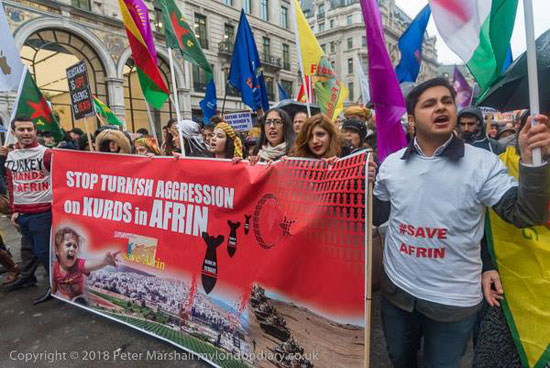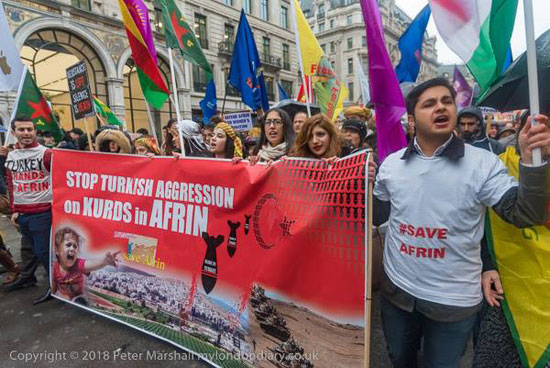
Photo by Peter Marshall
On 20 January 2018 Turkey launched an unprovoked attack on Afrin in northern Syria when 72 Turkish jets bombarded towns and villages. This was followed with a ground invasion by the Turkish army and its Free Syrian Army (FSA) auxiliaries. By 26 January over 50 civilians were reported killed by Turkish shelling and air strikes. However, the predominantly Kurdish People’s Protection Units (YPG) and Women’s Protection Units (YPJ) mounted fierce resistance, inflicting casualties on the Turkish forces. Cigdem Dogu, of the Kurdistan Women’s Communities, warned that the war on Afrin would be Turkey’s Vietnam and end President Erdogan’s rule: ‘He has ordered his own death. It will be the will of the peoples who will fight and who will prevail, not his advanced technology.’
Afrin is one of three cantons, or administrative areas, of Rojava in northern Syria. Its population of about 800,000 people has increased with refugees from other parts of Syria. There are approximately 10,000 YPG and YPJ guerrillas in Afrin, but fighters from the other cantons and from the fight against Islamic State (IS) are mobilising to support them. Kurdistan Workers’ Party (PKK) Executive Committee member Murat Karayilan said ‘the PKK won’t stand aside and watch. It won’t be a spectator, just as it was not a spectator for what happened in Kobane.’ The PKK is based in Turkey. Turkey’s President Erdogan calls the YPG/YPJ ‘terrorists’ and accuses Afrin of forming part of a ‘terror corridor’ threatening Turkey. Any manifestation of Kurdish ambition for self-determination is de-nounced as terrorism by Erdogan. Ever since the Rojava revolution liberated parts of northern Syria from Ba’athist rule in 2012, Turkey has threatened it and in June 2017 Turkish forces and the FSA fired mortars into Afrin city. They have repeatedly attacked Afrin from across the Turkish border and sought to expel Kurds from the region. Afrin, like the rest of Rojava, bases its self-administration on the principles promoted by PKK leader Abdullah Ocalan, imprisoned by Turkey since 1999: direct democracy, gender equality, secularism, inter-ethnic cooperation and environmental protection.
On 14 January the US said it intended to assist the formation of a 30,000-strong Border Security Force, of which the Syrian Democratic Forces (SDF) would be a core component. The YPG and YPJ form part of the SDF. This Border Security Force would patrol in Syria and along the Syria-Turkey border. The US supplied the SDF with weapons with which to fight IS. The Kurds describe the relationship with the US as a tactical alliance in the fight against IS, and liken it to the Soviet Union’s alliance with Britain and the US in the battle against the Nazis. The Turkish state cannot tolerate any such alliance and has used its NATO membership to challenge it. Turkey wants to establish a buffer zone in Syria.
Kurds are pawns no more
Three days before the attack on Afrin, Turkey’s undersecretary of the National Intelligence Service and its army Chief of Staff visited Moscow. YPG Commander General Sipan Hemo said that Russia, which had previously argued that no Syrian solution was possible without the Kurds, had betrayed them. Russia controls the skies above Afrin and withdrew soldiers stationed there hours before the attack was launched. Russia’s move is about its contest with the US for influence and control in Syria and the Middle East. For the US, Britain, Europe and Russia, the Kurds are pawns to be sacrificed.
On 22 January Russian Foreign Minister Sergei Lavrov said: ‘Washington has actively encouraged and continues to encourage separatist sentiment among Kurds. This is either a lack of understanding of the situation or an absolutely conscious provocation.’ Erdogan explained: ‘We have an agreement…with our Russian friends.’ In London, US Secretary of State Rex Tillerson sympathised with Turkey: ‘We recognise and fully appreciate Turkey’s legitimate right to protect its own citizens from terrorist elements that may be launching attacks against Turkish citizens and Turkish soil from Syria.’ British Foreign Secretary Boris Johnson echoed Tillerson: ‘Turkey is right to want to keep its borders secure. We share the goal of reducing violence and keeping the focus on the most important task: a political process in Syria that leads to the end of the Assad regime.’ However, Erdogan said that the attack would be extended from Afrin to Manbij, east of Afrin and close to the River Euphrates. There are some 2,000 US soldiers stationed in Syria and US special forces are in Manbij, where the SDF is also deployed. The New York Times reported that on 24 January US President Trump called Erdogan to warn ‘against the growing risk of conflict between the two nations’. The US government will demand that Turkey sides with it in its attempt to counter Russian and Iranian influence in Syria and the Middle East.
Erdogan is facing presidential elections scheduled for 2019. He is using the attack on Afrin to bolster chauvinistic sentiment. All Turkey’s main political parties, apart from the predominantly Kurdish Peoples’ Democratic Party (HDP), have supported the attack. Turkey’s prime minister summoned media editors and told them to ensure that coverage of the Afrin offensive was ‘patriotic’. Erdogan responded to HDP criticism of the invasion and its call for people to ‘show their democratic reactions’ by saying: ‘You are being followed. Wherever you take to the streets, our security forces will be at your throat. You can’t do whatever you want… just as we root those on the mountains out of their caves, we will not let you take to the streets.’ Just as the Turkish media is primed to depict the Turkish assault on Afrin as an act of self-defence, so, in Britain, the BBC has presented Turkey as being under attack from terrorists in Syria.
The Turkish state is confronting a people who have prepared for battle. After the Kurdish victory against IS in February 2015, Abdullah Ocalan warned that the Turkish state would target Afrin and said: ‘Today is not the day to build textile workshops, it is the day to build workshops for arms and ammunition, to create war communism and to root it in society.’ The Kurds are not pawns any longer. Their struggle for self-determination is crucial for the ending of imperialist domination of the Middle East and the removal of its local accomplices.
End all British arms sales to Turkey and all British military political collaboration with the Turkish state! Victory to the Kurdish-led resistance!
Trevor Rayne
Fight Racism! Fight Imperialism! 262 February/March 2018




